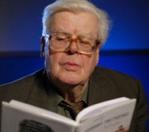Scottish Poet and Publisher Derick Thomson ‘Transformed’ Gaelic Poetry
Derick Thomson (Photo: BBC)
Scottish Poet Derick Thomson has died at the age of 90.
Poet, publisher, scholar, dictionary-maker: Derick Thomson — or Ruairidh MacThòmais, as he was known in his native Scottish Gaelic — had an outsize influence on the language and culture from which he sprang.
Born and raised in the village of Bayble, in the remote Outer Hebridean Isle of Lewis, Thomson had a long career as Professor of Celtic at Glasgow University, and a parallel career as a publisher.
“It’s impossible to imagine the world of the Gaelic language without Derick Thomson — Ruairidh MacThòmais,” says Ronald Black, Gaelic editor for The Scotsman newspaper and editor of “An Tuil,” an anthology of twentieth-century Scottish Gaelic poetry.
Black cites the 1951 co-founding of “Gairm” magazine as one of Thomson’s greatest achievements. The quarterly literary journal lasted more than 50 years, and launched many writing careers.
“It became the engine room for Gaelic literature, poetry and short stories in particular,” says Black.
Poet Aonghas Dubh MacNeacail agrees that Thomson’s influence stretched far beyond his poetry.
“This is a man who produced a dictionary, who produced a book on biology, who produced studies of the language for the general population. He was a man who worked in a huge, wide variety of fields.”
Still, it’s for his poetry that Thomson will best be remembered.
“He transformed Gaelic poetry,” says MacNeacail. “He was the first Gaelic poet to work in free verse really, and that released people like myself into using the language in new ways, using new rhythms.”
That break from centuries of tradition, says MacNeacail, also opened Gaelic poetry to the influence of contemporary European poetry.
An islander who spent most of his life in the big city, Thomson’s work explored the theme of exile, and the tension between the old ways and the new world. In one of his poems, “Clouds,” he talks about the “gaiety” and “brashness” with which he left his island. Then, describing the landmarks that he misses, he ends wistfully:
“But I went away from them on a tether
As far as love goes from hate.”
Aonghas MacNeacail says that exile is almost an unavoidable theme for Gaelic poets.
“I remember many years ago myself putting together the words in English that we were born with the shell of exile on our backs. We grew up — if you were educated at all, if you’re going on to higher education at all, it was almost inevitable that you would leave the island.”
Another theme in Thomson’s poetry was the Gaelic language itself — and what to Thomson was its painful decline during the course of the twentieth century. Thomson himself translated his poetry into English — but always composed in Gaelic.
In his poem “Coffins,” Thomson describes how, whenever he passed a joiner’s — or carpenter’s — shop in the city, he was transported to the workshop of his grandfather. He remembers the old man planing shavings from a plank as he made coffins. Meditating on his grandfather’s own death, Thomson then makes the leap to the situation of the Gaelic language, saying:
“And in the other school also,
where the joiners of the mind were planing,
I never noticed the coffins,
though they were sitting all round me;
I did not recognise the English braid,
the Lowland varnish being applied to the wood,
I did not read the words on the brass,
I did not understand that my own race was dying.
Until the cold wind of this Spring came
to plane the heart;
until I felt the nails piercing me,
and neither tea nor talk will heal the pain.”
Thomson’s verse was not always gloomy; he often employed a dry wit. In his poem, “Ma Gheibh mi Chaoidh a Ghlòir” (“If I Ever Make it to Heaven”), Thomson turns his eye on his own end.
“I quite believe,” he says, “that St. Peter will turn out to be a Lewisman — if I do sneak in at the Gate”.
